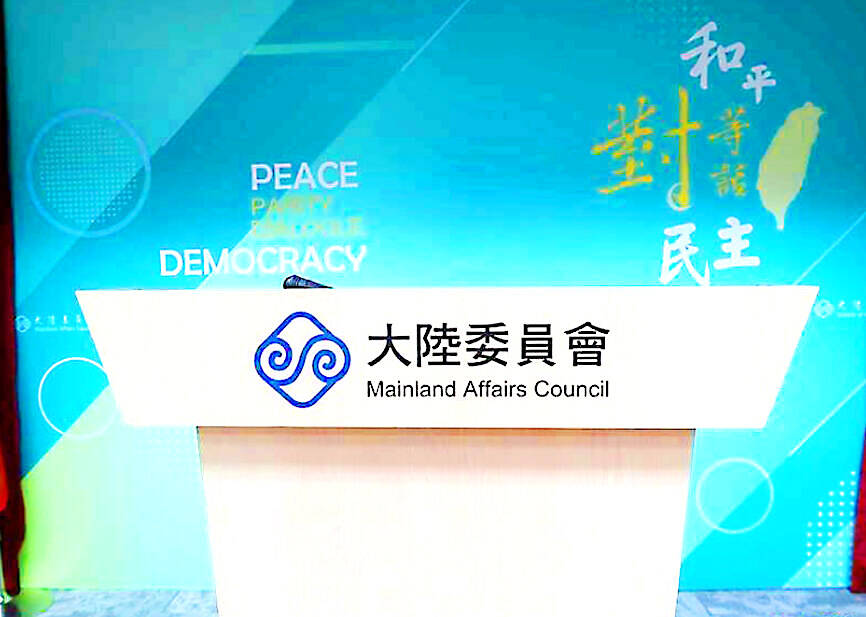The Chinese Communist Party’s (CCP) interference in Taiwan’s elections is an attempt aimed at compelling the new president-elect to negotiate on trade-related issues and moving toward its goal of economic integration, a recent report by the Mainland Affairs Council (MAC) said.
The report said that as the presidential election draws closer, the CCP has intentionally used the issues, including trade barrier investigation, bans on agricultural export and Chinese tourists to intensify its interference in Taiwan’s election.
The CPP also continued to meet with some Taiwanese figures to make the impression that cross-strait relations are facing a choice of future prospect — between “peace and war” and between “prosperity and recession” — with the aim of influencing voting intentions, it said.

Photo: Chung Li-hua, Taipei Times
The report attributed China’s interference to mainly three reasons: “Beijing’s heightened sense of crisis toward Taiwan’s situation,” that “the normalization of the US-Taiwan relationship has struck China’s raw nerve,” and that “China’s worsening domestic issues prompts it to intensify pressure on Taiwan.”
The Taiwanese government’s refusing Chinese President Xi Jinping’s (習近平) “one country, two systems” formula is seen by Beijing as challenging Xi’s Taiwan policy and damaging his prestige, it said.
China’s sluggish demand, sagging economy and high unemployment rate have contributed to internal pressure on Beijing to be more proactive on Taiwan.
Beijing is attempting to change the cross-strait relation structure from inside Taiwan by manipulating voters to elect a more China-friendly president, the report said.
Beijing aims to change the cross-strait dynamics from being among “equals” to a “master-slave relationship,” it said.
China is using its trade barrier investigation and other elements of psychological warfare to threaten Taiwanese, the report said.
Another aim of such psychological warfare is to put pressure on the president-elect to restart the cross-strait service trade agreement and economic cooperation framework agreement talks with China to accomplish “cross-strait economic integration,” it said.
The scholars commissioned by the MAC to produce the report said that although increasingly more Taiwanese businesspeople doing business in China are returning to Taiwan, the government should take necessary actions to assist them and prevent their losses.
In the mid to long term, the government should assist those that would be badly affected by an industrial transformation by increasing their resilience, and in the short term it should at least provide similar-scaled subsidies to make up for the effect of China’s coercive actions, they said.

Chinese Nationalist Party (KMT) Chairman Eric Chu (朱立倫), spokeswoman Yang Chih-yu (楊智伃) and Legislator Hsieh Lung-chieh (謝龍介) would be summoned by police for questioning for leading an illegal assembly on Thursday evening last week, Minister of the Interior Liu Shyh-fang (劉世芳) said today. The three KMT officials led an assembly outside the Taipei City Prosecutors’ Office, a restricted area where public assembly is not allowed, protesting the questioning of several KMT staff and searches of KMT headquarters and offices in a recall petition forgery case. Chu, Yang and Hsieh are all suspected of contravening the Assembly and Parade Act (集會遊行法) by holding

PRAISE: Japanese visitor Takashi Kubota said the Taiwanese temple architecture images showcased in the AI Art Gallery were the most impressive displays he saw Taiwan does not have an official pavilion at the World Expo in Osaka, Japan, because of its diplomatic predicament, but the government-backed Tech World pavilion is drawing interest with its unique recreations of works by Taiwanese artists. The pavilion features an artificial intelligence (AI)-based art gallery showcasing works of famous Taiwanese artists from the Japanese colonial period using innovative technologies. Among its main simulated displays are Eastern gouache paintings by Chen Chin (陳進), Lin Yu-shan (林玉山) and Kuo Hsueh-hu (郭雪湖), who were the three young Taiwanese painters selected for the East Asian Painting exhibition in 1927. Gouache is a water-based

Taiwan would welcome the return of Honduras as a diplomatic ally if its next president decides to make such a move, Minister of Foreign Affairs Lin Chia-lung (林佳龍) said yesterday. “Of course, we would welcome Honduras if they want to restore diplomatic ties with Taiwan after their elections,” Lin said at a meeting of the legislature’s Foreign Affairs and National Defense Committee, when asked to comment on statements made by two of the three Honduran presidential candidates during the presidential campaign in the Central American country. Taiwan is paying close attention to the region as a whole in the wake of a

OFF-TARGET: More than 30,000 participants were expected to take part in the Games next month, but only 6,550 foreign and 19,400 Taiwanese athletes have registered Taipei city councilors yesterday blasted the organizers of next month’s World Masters Games over sudden timetable and venue changes, which they said have caused thousands of participants to back out of the international sporting event, among other organizational issues. They also cited visa delays and political interference by China as reasons many foreign athletes are requesting refunds for the event, to be held from May 17 to 30. Jointly organized by the Taipei and New Taipei City governments, the games have been rocked by numerous controversies since preparations began in 2020. Taipei City Councilor Lin Yen-feng (林延鳳) said yesterday that new measures by